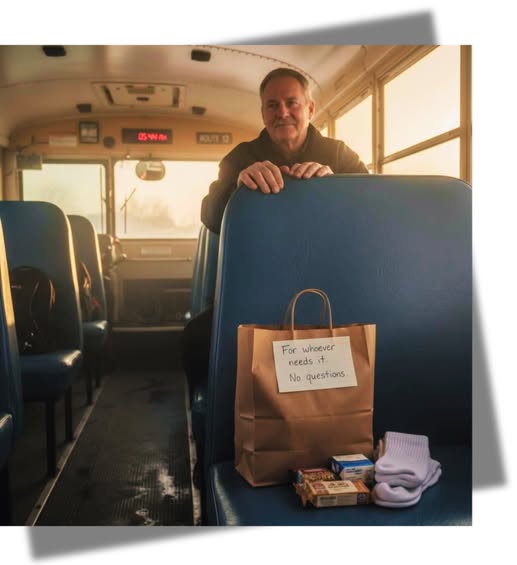
At 5:45 a.m. on Route 12, Hank Carter noticed something that changed everything: wet footprints trailing from seat thirteen.
The 57-year-old bus driver had just returned from winter break when a boy climbed aboard late, hoodie up, backpack sagging. The smell hit Hank immediately—yesterday’s shirt, unwashed. He knew it from his own childhood. When the boy stood at school, his socks had bled snowmelt through broken sneakers, leaving a dark stain on the vinyl.
The next morning, Hank arrived early with a brown paper bag: granola bar, milk box, hand warmers, dollar-store socks. He taped a note to it—”For whoever needs it. No questions”—and left it on seat thirteen.
By the final stop, the bag was gone. Folded neat under the seat.
That January morning became a daily ritual. Some days the bag sat untouched. Other days it vanished by the third stop, replaced with notes pressed so hard the pencil nearly tore through: “You saved my morning.” “These socks hug my feet.”
Then something unexpected happened. A girl with perfect hair left chapstick in the bag. A quiet kid added colored pencils. The depot custodian started bringing Ziplocs of cereal. “I remember being fifteen and hungry enough to eat paper,” he told Hank.
In March, fifth-grader Jayden boarded with red eyes, reached for the bag, then stopped. At the last stop, he grabbed it and tapped a smaller kid wearing a cast and a coat two sizes too thin.
“Here,” Jayden said. “It’s for you.”
Hank’s knuckles went white on the steering wheel.
By April, the offerings multiplied. Hot cocoa packets. A bus pass. One note in cursive read: “My son used this seat last month. He’s sleeping better now. Thank you for seeing him.”
On the last day of school, Hank stood and faced the rowdy bus. “Seat thirteen belongs to all of us,” he said, voice shaking. “In the fall, if you need it, it’s yours. If you don’t, help me keep it full.”
They nodded like they understood the rules.
Every August since, Hank packs that bag before dawn. New faces board. The same seat waits. At 6:12 a.m., small hands pass brown paper bags without words. A seat no one owns becomes a promise everyone keeps.
When asked why he does it, Hank shrugs. “You don’t need a program to change a life. You just need a place, a habit, and courage to leave something behind.”
Seat thirteen stays full. So do the kids who need it.
